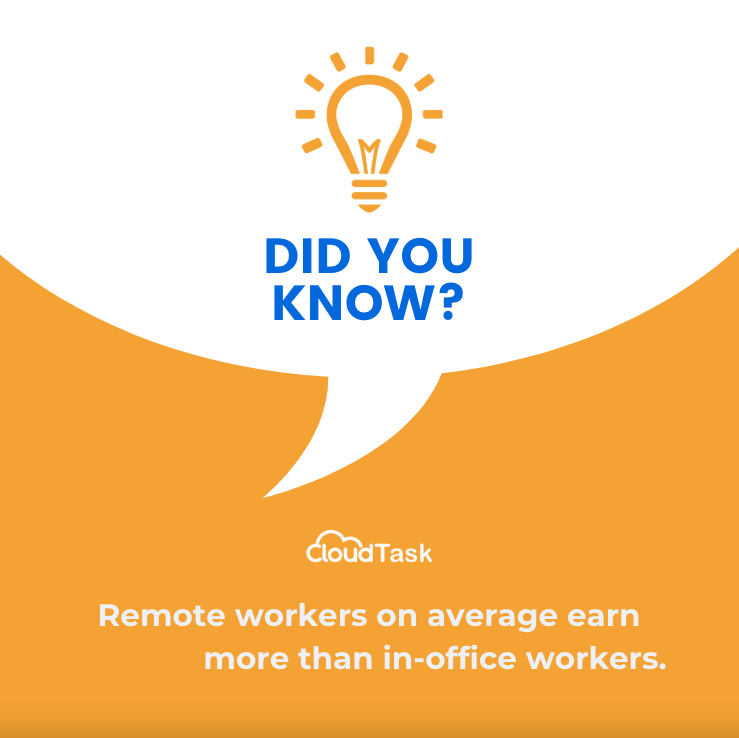Economic freedom has never been more attainable. The global paradigm shift towards remote work has democratized opportunities for talent residing in economically challenged regions. Latin America, for instance, has emerged as a focal point, whereby potential employers provide equal opportunities and bring local jobs back to developed countries. The allure of remote work lies in its promise of economic growth and job stability for remote teams or educated workers who come from regions facing economic hardships. Remote jobs usually pay higher wages, especially in regions grappling with unemployment and limited local opportunities.
Why are Remote Reps from Economically Challenged Regions more Grateful and Hungry for Opportunities?
Teleworkers from Latin America often exhibit a greater level of gratitude and eagerness for remote jobs. Why? The answer lies in their limited local options and the potential for an improved quality of life. Consider the fact that US-based companies provide Latin Americans with the opportunity to work remotely, bypassing local labor market competition for dwindling job options.
The Hire-Train-Deploy model exemplifies how individuals, even without exact market-demanded skills, can access high-value economic opportunities through remote work. CloudTask is a critical player in realizing this opportunity, especially by establishing a physical presence in locations like Colombia, Puerto Rico, Eastern Europe and other developing regions. They identify, vet, and train local talent, subsequently placing them into remote work positions, hence bridging the gap between demand and supply of skilled remote workers.
The Rise of Remote Work and Economic Opportunities
The shift towards remote work catalyzed by the ongoing globalization wave, is seen as a potential boon to bring jobs, especially for economically strained regions like Latin America. Remote work has the capability to address the chronic issues of income disparities, brain drain, and high unemployment rates prevalent in such regions. Considering the vast market size of these economies, income disparities are particularly stark when comparing Latin America to more affluent regions, and this disparity often fuels the quest for better-paying jobs among the populace.
The tradition of skilled individuals and physical migration to developed regions in search of better opportunities, known as brain drain, has long plagued these nations by stripping them of crucial human capital which hampers local economic growth. Furthermore, the high rates of unemployment and underemployment continue to be persistent challenges. The introduction of remote work opportunities aims to ameliorate these issues by expanding the job market beyond local boundaries, thereby providing a pathway to economic revitalization.
With the globalization of service provision and hiring, facilitating the detachment of employment from geographical confines, options to work remotely play a significant role in expanding employment horizons. The ability to work remotely not only has the potential to alleviate unemployment issues and economic challenges but also suggests major implications for curbing the brain drain phenomena and providing opportunities for job seekers.
By enabling skilled individuals to offer their services to companies in developed markets without the need for physical relocation to more urban areas and metropolitan regions, remote work helps retain talent within local ecosystems, which is crucial for economic growth.
Additionally, the prospect of accessing remote employees cost-effectively has attracted global enterprises, accustomed to incurring a higher cost and paying higher compensation in places like the United States, specifically, in trendy big cities like San Francisco. This symbiotic relationship could be mutually beneficial, providing international companies with the requisite talent and the local workforce with better employment opportunities, thus creating a win-win scenario.
The comparative analysis of job markets underscores the stark wage disparity between developed and developing regions, exacerbated by demand-supply dynamics and cost-of-living disparities. For instance, the significant wage difference between a sales rep in San Francisco and one in Sao Paolo (average wage USD 7 per hour), highlights this issue.
By extending opportunities to hire remote workers, a more equitable wage structure worldwide can be facilitated. This global competition for talent could potentially drive up wages in developing markets, benefiting the local workforce. Moreover, according to data sources, traditional business models in developing markets often hinge on cost advantages and may face disruption as remote work dismantles geographical barriers.
This compels local companies to shift towards value creation and innovation to remain competitive in this evolving landscape. Findings suggest that the transition towards a remote work-centric model holds promise for a more equitable global job market, the dependent variable is that this requires a strategic approach to fully harness its benefits while navigating the potential adversities that come with it. Remote work has experienced significant growth, creating new economic opportunities for businesses and employees alike. Factors driving this adoption include the pandemic; cost reduction; access to a global labour market and technological advancements.
Remote Work by Industry and Occupation

It appears that some jobs are geared toward working remotely than others. Understanding these trends helps to determine how remote working may evolve over time. The IT sector is the biggest remote-working sector in 2023. This translates to the fact that tasks performed in this sector are typically digital and require reliable high-speed internet. The skillsets most hired for among several industry groups include marketing, sales, accounting and finance, managing professional services, data entry, administrative support, customer service representative and customer success roles. There are also other industries that are adopting remote working and using digital tools for the continuity of the work process.
Analysing the Benefits of Going Remote for Businesses

Access a Worldwide Talent Pools
Seamless Collaboration Time Zones (For US-based Enterprises)
Engaging remote employees entails navigating through a myriad of challenges, not to mention the legal and compliance hoops. However, Latin America presents a notable advantage for US companies in search of remote talent.
Time zone compatibility
Despite both the US and Latin America having varied time zones, they are mostly aligned, minimizing potential disruptions. For instance, Argentina, Chile, Uruguay, Bolivia, and parts of Brazil are merely an hour ahead of Eastern Standard Time, facilitating easy collaboration between east coast US employees and their counterparts in these nations. Even for the west coast, the time difference is just a few hours, making interactions with Latin American colleagues more manageable compared to those in Asia or Europe.
Fostering Innovation through Workforce Diversity
The infusion of diverse talent into a company’s workforce is more than a mere global inclusion gesture; it’s a solid business strategy. One study indicates that organizations with diverse personnel have a 2.5x higher cash flow per employee compared to those with more homogenized teams.
Diverse teams, with their array of thinking frameworks, are adept at crafting novel, creative solutions to problems. The diversity in thought and perspective leads to a 20% higher innovation rate and 19% increased innovation revenues, as per a 2020 study. This is particularly relevant when tapping into Latin America’s talent pool, which brings a range of cultural, linguistic, and professional backgrounds to foster innovation within your organization.
Ascending English Proficiency Indicating Global Work Aspirations
Historically, Latin America was perceived as a region with low English proficiency, but the narrative is shifting. Education’s First’s latest annual English Proficiency Index highlights an uptick in English language scores across almost every Latin American country between 2021-23. This evolution, from ‘Very Low’ to largely ‘Moderate’ proficiency over a decade, aligns with the global work aspirations of the Latin American workforce.
The data unveils a generational trend, with individuals in their 30s and those aged 26-30 showing remarkable improvements in English proficiency since 2015. This change, driven not by formal education but by the aspiration to thrive in global workspaces where English is indispensable, opens new vistas for international collaborations.
Lower Operational Cost Savings

A notable instance of cost reduction is evident in the tech sector. Developers from Latin America offer budget-friendly solutions without sacrificing quality, primarily owing to the reduced cost of living in the area. Businesses can harness their capabilities and knowledge at competitive prices relative to other regions, which streamlines resources and guarantees efficient project results while upholding elevated work standards.
Companies can achieve a significant reduction in expenditures by transitioning to remote work. By reducing expenses associated with maintaining physical office spaces, employers can save up to $11,000 per employee each year. These savings can be redirected to other business priorities or investments, ultimately benefiting the company’s bottom line.
Reduced Payroll Costs
A significant motivation for employing international personnel from Latin America stems from the generally lower salary scales prevalent in the region. A study conducted recently by CodeSubmit revealed that, on average, a software engineer in Argentina earns $39,898, which is substantially lower than their counterparts in the US, who earn $110,140.
The lower cost of living in many Latin American countries compared to the US or the UK often makes workers more amenable to accepting lower salaries.
Significantly, the broad discrepancy between salary expectations in Latin American local economies and domestic pay rates presents ample opportunity to reach a mutually beneficial arrangement. By offering slightly higher remuneration to Latin American workers, companies in the US and other regions can achieve substantial savings while ensuring their employees perceive their compensation as favorable.
Increased Productivity and Flexibility
Evidence suggests that remote work boosts productivity and flexibility for workers. In fact, to provide evidence from a study conducted by Gallup, 35% of remote employees report increased productivity when working remotely. This can be attributed to fewer distractions, more focused work, and the ability to design a personalized work environment that suits each individual’s needs and preferences.
Remote work also encourages self-discipline, time management, and the development of both digital know-how and communication and collaboration skills, which are invaluable in the modern workplace. Employees also enjoy the flexibility that remote work provides in terms of scheduling and location. This allows workers to better manage their time, work more hours, prioritize tasks, and maintain a healthy work-life balance while delivering services. As remote work continues to gain popularity, employees will likely see even more prospects to leverage this flexibility to improve their overall well-being and job satisfaction.
Expanded Business Opportunities & Competitive Edge
By hiring bilingual Latin American workers, companies can explore new business opportunities in those markets, understand market dynamics, consumer behavior, and regulatory frameworks, making informed business decisions and expand into untapped areas of industry. The ability to communicate effectively with international clients, collaborate with diverse teams, and navigate cross-cultural dynamics provides a competitive edge in the global market, enhancing the company’s reach.
Developing Countries and Remote Work Opportunities

Challenges for Developing Regions
While remote work presents new economic opportunities, it also poses challenges for developing regions. Some common challenges faced by remote workers in developing economics include:
Limited access to quality healthcare
Limited job prospects
Social isolation
Lack of community support
These challenges can hinder productivity and communication, limiting the types of remote work opportunities available and resulting in lower costs and decreased economic opportunities. Despite these challenges, remote work can still bring positive change to Less developed countries. As more people choose to work remotely, there is potential for a decrease in the strain on big cities’ housing markets. Additionally, remote work can enable individuals to transition from urban centers to Economically challenged regions on a short-term basis, potentially improving their quality of life and contributing to the local economy.
Reducing Brain Drain
Brain drain which is the migration of skilled workers from their home countries to other countries in pursuit of more advantageous employment opportunities, can have a detrimental effect on local market. Remote work has the potential to reduce brain drain by providing access to employment opportunities without the need for migration. This can help attract top talent and offer flexibility, ultimately benefiting the domestic economy. However, most countries in the Global South have limited involvement in the remote labor market, with the notable exceptions of the Philippines, Bangladesh, Pakistan, and India. By embracing remote work and investing in the necessary infrastructure, these countries can access a larger talent pool and reduce the negative impacts of brain drain on their economies.
Disruption of Traditional Business Models
Remote working has the potential to turn existing business models in developing markets upside down. This disruption can lead to some unforeseen changes which may not always be positive. As more companies adopt remote work practices, traditional industries may need to adapt to new ways of operating and competing in the global marketplace.
This includes the adoption of new technologies, digital transformation initiatives, and the need to access and leverage a global talent pool. In addition to disrupting traditional business models, remote work can also impact the international division of labor. The extent to which remote work brings employment opportunities to growth economies and disadvantaged regions, or reinforces existing global spatial disparities, remains to be seen. As remote work continues to gain momentum, its effects on developing countries and their economies will become increasingly apparent.
Remote Workers Vs In Office Workers

The average wage for remote positions in Latin America presently hovers between $3.3k and $4.5k monthly, although some firms extend offers reaching up to $9k per month.
Remote jobs are known for boosting average wages. Remote workers average about $19,000 higher than those at home. A remote worker makes about $74,000, while an office worker generally earns around 55.000. For those opting for hybrid work models, median annual salaries are $81,000. The flexibility and balance of hybrid work allow workers to maximize productive output and potentially take on additional responsibility.
The Future of Remote Work and Economic Opportunities

The future of remote work and economic opportunities is full of potential, with numerous benefits for various industries, domestic economies and developing countries. However, there are also challenges to overcome and adapt to, such as the potential impact on large cities, emerging nations, and traditional business models.
Potential Shifts in Global Talent Distribution
As remote work continues to gain traction, we can expect to see shifts in global talent distribution. Broadening the talent pool allows companies to access a wider scope of skills, fostering innovation and competitiveness. Remote work also enables the attraction of new talent, as individuals can work from anywhere and take advantage of remote jobs without having to relocate. However, the extent to which remote work will alter traditional talent hotspots and bring employment opportunities to economically challenged regions remains uncertain. As remote work becomes more prevalent, economies of developing countries must adapt to new economic realities, attracting global talent and addressing challenges faced by rural areas.
Remote Job Benefits To Developing Regions

Economic benefits of remote work
Remote work has grown increasingly popular across multiple industries, such as computer and IT, marketing, accounting and finance, project management, medical and health, HR and recruiting services, and customer service. This provides employees with more opportunities for flexible working arrangements and employers with access to global talent and savings on costs.
COVID-19 has unveiled a plethora of opportunities for skills transfer. This transition has not only facilitated a seamless continuity in services amidst the pandemic but has also catalyzed accelerated learning and transfer of essential skills among remote workers. Moreover, working remotely has fostered a global exchange of digital skills, enriching the overall quality and delivery of services. The collaborative tools and platforms utilized in remote work environments serve as conduits for this skills transfer, enabling individuals to learn, adapt, and excel in delivering services in a digitally driven work landscape.
This symbiotic relationship between working remotely and skills transfer has significantly benefited both the individuals and the organizations they represent, ensuring a robust, digitally adept workforce capable of navigating the myriad challenges posed by the pandemic while ensuring the unimpeded delivery of services.
Furthermore, the interactive nature of remote working platforms has created a conducive environment for continuous learning and improvement, thereby not only elevating the quality of services delivered but also significantly contributing to the professional development of the remote workforce. Through this lens, it’s palpable that the COVID-19 pandemic, albeit its adversities, has played a pivotal role in accentuating the importance of digital skills transfer in optimizing the delivery of services in a remote working setup.
Societal benefits of remote working
Remote work provides many societal benefits, such as increased cost-efficiency for employers and greater flexibility, work-life balance, and employee health for employees. It can also reduce environmental impact and open up opportunities to rural residents who lack job prospects in their area. Finally, remote work helps prevent the spread of disease and could even ease political tensions.
Remote work potential across industries and cities
Our work begins by demonstrating that the business services industry is highly remote and that it is located in highly populated, expensive cities. We used the job-based work-from-home classification developed by Dingel or Neiman in 2020 and merged that data into micro-data from the United States Census.
Key Takeaways
Remote work provides businesses and employees with cost savings, increased productivity, better work-life balance, access to a larger talent pool and greater flexibility.
The economies of lesser-developed regions can benefit from the influx of global talent by embracing remote work in the digital economy resulting in economic growth and higher wages.
To maximize benefits associated with remote work potential challenges must be addressed proactively, such workers bring benefits to outsourced businesses but also require their own set of benefits.
With the right panel or team, things happen that can broaden the skill set of those from regions that are economically challenged, and provide job opportunities, especially for many who were economically impacted by the covid 19 pandemic.
Remote employees can increase much-needed tax revenue for developing economies.
Do you know someone looking for a remote job? Are you hiring for remote roles? Get access to our global talent database.









